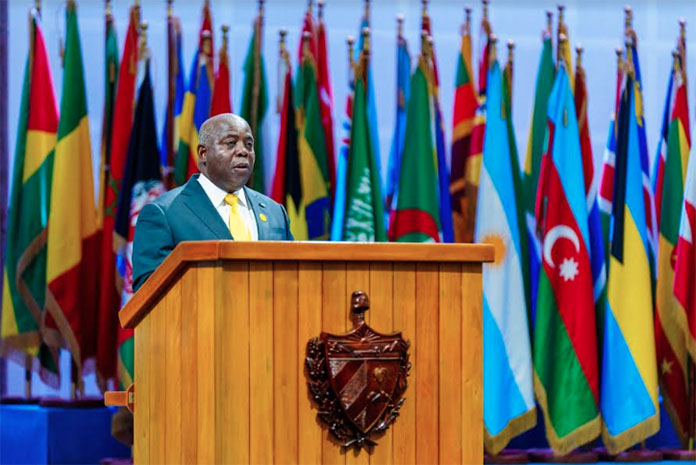Prime Minister Philip Davis Urges the United Nations to Take a Leading Role as Arbiter in International Tax Cooperation & Administration Issues at the G77+China Summit in Havana, Cuba

Havana, Cuba — In his address at the G77+China Summit, Prime Minister Hon. Philip Davis KC MP firmly advocated for the United Nations to oversee international tax cooperation and administration.
Expressing his gratitude to the Republic of Cuba for hosting the event, the Prime Minister swiftly turned his attention to the pressing issue of blacklisting. “For too long we have lived in an environment where global tax policy was mandated and designed by the OECD, where the interests of the Global North prevail, often at the expense of small developing countries, primarily black governed former colonies in the Global South,” Prime Minister Davis said.
Highlighting the disproportionate impacts of blacklisting by the OECD and EU on countries of the Global South, Prime Minister Davis detailed the hardships faced by nations like The Bahamas. “The arbitrary and discriminatory actions of the OECD and EU have left countries of the Global South grappling with challenges not of their making. The climate crisis, largely created by industrialized countries, many in the Global North, poses existential threats to nations like ours. Blacklisting compounds these challenges, often leading to punitive financial penalties.”
In a compelling call to action, the Prime Minister emphasized the urgency for change. “We demand equal treatment. The United Nations, representative of all nations, is the appropriate body to design and build a truly equitable and inclusive international tax administration architecture. An environment of one country, one vote.”
Drawing attention to the existing movement at the United Nations supporting a more inclusive approach to international tax cooperation, Prime Minister Davis said, “We are calling for the United Nations to step into its rightful role as the primary arbiter in global tax matters. We urge the G77 to rally behind this cause, championing an environment where developing countries in the Global South have the same policy impact globally as developed countries of the Global North.”
The Prime Minister concluded his address with a unifying message, “The way forward for the G77 is clear: It’s a path paved with unity, solidarity, and a call for the United Nations to take its rightful place in global tax governance.”
ENDS
Background on the G77+China
The G77, established in 1964, is a coalition of developing countries designed to promote their collective economic interests at the United Nations. Originally formed by 77 countries, its membership has expanded, but the name remains for historical significance. The “+China” indicates China’s supportive but non-member relationship with the group.
Issue of the UN and International Tax Cooperation
The international tax system, largely influenced by organizations like the OECD, is often criticized for favoring wealthier, developed nations. Given its inclusive nature, many developing countries advocate for the United Nations to take a leading role in international tax cooperation, hoping for a more equitable system where all nations have equal input.







